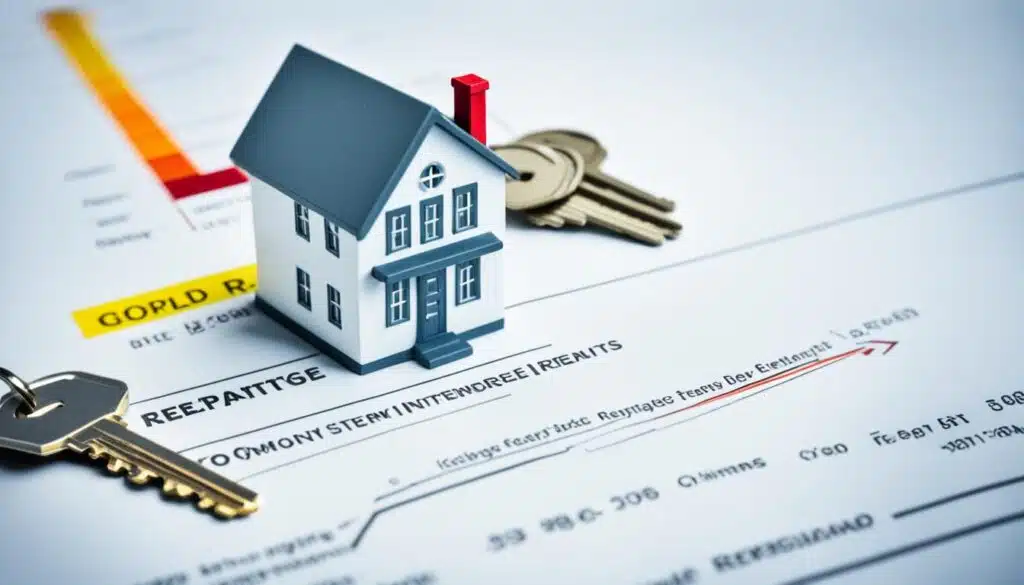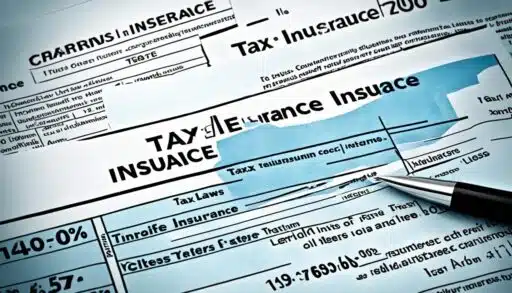When it comes to taking out a home loan, understanding the advantages of different mortgage term options is essential for securing your financial future. Whether you’re a first-time homebuyer or looking to refinance, knowing the benefits can help you make informed decisions that align with your goals.
Mortgage term benefits encompass various advantages that can significantly impact your financial outlook. These benefits include lower interest rates, flexible repayment options, potential tax deductions, and the ability to pay off your loan faster. By exploring these advantages, you can select the mortgage term that best suits your needs and sets you on a path to financial stability.
Key Takeaways:
- Lower interest rates are a key advantage, especially for fixed-rate mortgages with shorter loan terms.
- Flexible repayment options give borrowers the freedom to choose a payment plan that fits their budget.
- Potential tax deductions for mortgage interest and property taxes can result in significant savings.
- Choosing a shorter loan term allows you to pay off your mortgage faster and build home equity more rapidly.
- Consider the pros and cons of different mortgage terms to make an informed decision that aligns with your financial goals.
Lower Interest Rates
Mortgage term benefits can include lower interest rates, especially for fixed-rate mortgages with shorter loan terms. Shorter-term mortgages often come with lower interest rates compared to longer-term options. This can result in significant savings over the life of the loan, allowing homeowners to pay less interest and potentially pay off their mortgage faster.
By opting for a shorter loan term, borrowers can take advantage of the benefits of lower interest rates. This is particularly true for fixed-rate mortgages, which offer stability and consistent monthly payments throughout the loan term.
A fixed-rate mortgage is a type of home loan where the interest rate remains the same throughout the entire term. This means that the interest rate you agree upon with the lender at the beginning of the loan will remain unchanged, providing peace of mind and predictability when it comes to mortgage payments.
Here is a comparison of the average interest rates for 30-year fixed-rate and 15-year fixed-rate mortgages:
| Loan Term | Average Interest Rate |
|---|---|
| 30-year fixed-rate | 3.25% |
| 15-year fixed-rate | 2.75% |
As you can see, the 15-year fixed-rate mortgage offers a lower average interest rate compared to the 30-year option. This can result in substantial savings over the life of the loan.
In addition to lower interest rates, a shorter loan term can also help homeowners build equity in their homes faster. As more of the monthly mortgage payment goes towards the principal balance, the homeowner’s equity in the property increases more quickly. This can be advantageous if you plan to sell the property or use your home equity for future financial needs.
Furthermore, choosing a shorter loan term can provide financial security by allowing borrowers to become mortgage-free sooner. Paying off the mortgage faster can free up monthly cash flow and provide a sense of accomplishment.
It’s important to note that while shorter-term mortgages come with the benefit of lower interest rates, they typically have higher monthly payments compared to longer-term options. Therefore, it’s essential to carefully consider your budget and financial situation before committing to a shorter loan term.
A mortgage lender can help you evaluate your options and determine the mortgage term that best aligns with your long-term financial goals.
Flexible Repayment Options
One of the key advantages of mortgage term benefits is the availability of flexible repayment options. Different mortgage terms offer varying monthly payment amounts, giving borrowers the flexibility to choose a payment that fits their budget. This flexibility allows individuals to better manage their finances, ensuring that their mortgage payments align with their current financial situation.
One type of mortgage that provides flexibility in repayment is the adjustable-rate mortgage (ARM). With an ARM, the interest rate and monthly payment can fluctuate over time. This can be advantageous in certain market conditions where interest rates are expected to decrease. Borrowers can take advantage of lower rates, resulting in potentially lower monthly payments. It’s important to note that the interest rate and monthly payment may increase in the future if market conditions change.
Why choose an adjustable-rate mortgage?
There are several reasons why borrowers may choose an adjustable-rate mortgage:
- Lower initial monthly payments: Adjustable-rate mortgages often have lower initial monthly payments compared to fixed-rate mortgages. This can be beneficial for borrowers who have a tight budget or expect their income to increase in the future.
- Flexibility: ARMs offer flexibility in repayment terms, allowing borrowers to take advantage of lower interest rates in the market. This flexibility can be particularly beneficial for individuals who plan to sell their property or refinance their mortgage before the interest rate adjustment period begins.
- Shorter repayment term: Borrowers who are confident about their ability to pay off their mortgage in a shorter timeframe may choose an ARM with a shorter repayment term. This can result in overall interest savings and faster loan repayment.
It’s important for borrowers to carefully consider their financial situation and risk tolerance when choosing an adjustable-rate mortgage. Consulting with a mortgage professional can help individuals understand the potential benefits and drawbacks of this type of mortgage.
| Advantages | Disadvantages |
|---|---|
|
|
It’s important for borrowers to weigh the advantages and disadvantages of adjustable-rate mortgages and consider their personal financial goals before making a decision.

Potential Tax Deductions
One of the significant advantages of mortgage term benefits is the potential for tax deductions. Homeowners can take advantage of tax deductions related to their mortgage interest and property taxes. By claiming these deductions when filing taxes, homeowners can enjoy significant savings and reduce their overall tax liability.
When it comes to mortgage interest, homeowners may be able to deduct the interest paid on their mortgage loan. This deduction can result in substantial savings, especially for homeowners with a higher mortgage balance or longer mortgage terms. By deducting mortgage interest, homeowners can lower their taxable income and potentially receive a higher tax refund.
Additionally, property taxes paid on the home can also be eligible for deductions. Homeowners can claim deductions for the property taxes they pay annually, which can help reduce their tax burden. By utilizing this deduction, homeowners can lower their taxable income and potentially save thousands of dollars in taxes.
Maximizing Tax Deductions: Tips for Homeowners
To maximize tax deductions related to mortgage term benefits, homeowners should keep track of their mortgage interest and property tax payments throughout the year. It’s essential to gather accurate documentation and consult with a tax professional to ensure eligibility for these deductions.
“Homeowners can maximize their tax deductions by keeping thorough records of mortgage interest and property tax payments. Consulting with a tax professional can help ensure that homeowners take advantage of all eligible deductions.”
Here are a few tips to help homeowners maximize their tax deductions:
- Keep copies of mortgage statements and annual mortgage interest statements.
- Maintain records of property tax payments and annual statements from the tax authorities.
- Consider itemizing deductions on tax returns to claim mortgage interest and property tax deductions.
- Consult with a tax professional to ensure accurate filing and identification of all eligible deductions.
By following these tips and taking advantage of available deductions, homeowners can significantly reduce their tax liability and keep more of their hard-earned money.

Pay Off the Loan Faster
One of the key advantages of mortgage term benefits is the ability to pay off the loan faster. Choosing a shorter loan term, such as a 15-year mortgage, can result in accelerated loan repayment and the ability to build home equity more quickly. This can provide financial stability and the option to become debt-free sooner.
“By choosing a shorter loan term, homeowners have the opportunity to pay down their mortgage faster and save on interest expenses.”
When you opt for a shorter loan term, you commit to higher monthly payments. However, the benefits can be significant. Let’s take a look at an example:
| Loan Term | Interest Rate | Monthly Payment | Total Interest Paid | Total Cost of Mortgage | Equity Built |
|---|---|---|---|---|---|
| 30 years | 3.5% | $1,123 | $164,813 | $314,813 | $0 |
| 15 years | 2.8% | $1,678 | $70,088 | $270,088 | $44,000 |
In this example, choosing a 15-year loan term at a lower interest rate can save you $94,725 in total interest paid and allow you to build $44,000 in home equity. Although the monthly payment is higher, the long-term benefits outweigh the initial financial commitment.
Furthermore, paying off your mortgage faster provides a sense of financial security and the potential to pursue other investment opportunities. With a shorter loan term, you can enjoy the benefits of mortgage term benefits sooner and focus on other financial goals.
Dedicated Strategies for Faster Loan Repayment
Aside from choosing a shorter loan term, there are additional strategies you can employ to pay off your mortgage faster:
- Make extra payments: Apply any extra funds towards your principal balance. Even small additional payments can have a significant impact on reducing the overall loan term.
- Consider mortgage recasting: If you receive a substantial lump sum of money, you can use it to lower your mortgage principal through a process called recasting. This allows you to maintain your loan term but reduce your monthly payments.
- Refinance to a 15-year term: If you currently have a longer loan term, refinancing to a 15-year term can lower your interest rate and significantly accelerate your loan repayment.
By implementing these strategies and taking advantage of the benefits offered by a shorter loan term, you can achieve financial freedom and pay off your mortgage sooner.

Pros and Cons of Different Mortgage Terms
When deciding on a mortgage term, it’s crucial to carefully consider the pros and cons of the available options. This evaluation will help you determine the mortgage term that best aligns with your financial goals. Let’s explore the advantages and disadvantages of two popular mortgage terms: the 30-year mortgage and the 15-year mortgage.
30-Year Mortgage
One of the main advantages of a 30-year mortgage is its lower monthly payments. By spreading the loan repayment over a longer period, homeowners can enjoy more manageable monthly mortgage installments. This can provide greater flexibility in budgeting, allowing homeowners to allocate funds to other expenses or investments.
However, it’s important to note that opting for a longer-term mortgage may result in paying more interest over the life of the loan compared to shorter-term options. Additionally, building home equity may be slower with a 30-year mortgage. Despite these considerations, a 30-year mortgage is a popular choice for many homeowners looking for affordability and flexibility.
15-Year Mortgage
A 15-year mortgage offers the advantage of faster loan repayment. With shorter loan terms, homeowners can pay off their mortgage in half the time compared to a 30-year term. This accelerated payoff can help individuals build equity in their homes more quickly, providing a sense of financial security.
However, it’s important to note that a 15-year mortgage comes with higher monthly payments. The shorter loan term requires borrowers to make larger monthly installments to pay off the loan within the predetermined timeframe. This higher monthly payment may impact individuals’ disposable income and overall budget. Nevertheless, for those who prioritize paying off their mortgage quickly and minimizing interest costs, a 15-year mortgage can be an attractive option.
| Factors | 30-Year Mortgage | 15-Year Mortgage |
|---|---|---|
| Monthly Payment | Lower | Higher |
| Interest Paid | Higher | Lower |
| Loan Term | 30 Years | 15 Years |
| Builds Equity | Slower | Faster |
As shown in the table, a 30-year mortgage offers lower monthly payments but may result in higher interest paid over time. In contrast, a 15-year mortgage accelerates loan repayment and builds home equity faster but comes with higher monthly payments. Assessing these factors in relation to your financial goals and circumstances can help you make an informed decision when choosing a mortgage term.
Ultimately, the ideal mortgage term depends on your individual financial situation, long-term plans, and personal preferences. It’s essential to consult with a mortgage lender to explore the options available and gain a comprehensive understanding of the pros and cons of each mortgage term. By carefully considering these factors, you can select the mortgage term that best supports your financial goals and maximizes the benefits of your mortgage term.
Stay Informed for an Informed Decision

Understanding the pros and cons of different mortgage terms is crucial when choosing a mortgage term. By weighing factors such as monthly payments, interest paid, loan term, and equity development, you can make an informed decision that aligns with your financial goals. Remember, everyone’s circumstances are unique, and what suits one individual may not be the ideal choice for another.
Continue reading to gain a deeper understanding of mortgage term benefits, considerations, and the impact of mortgage term length on your financial future.
Understanding the Mortgage Term Length
When exploring mortgage term benefits, it’s crucial to understand the mortgage term length. The term refers to the duration over which the mortgage is repaid. Common mortgage term lengths include the popular 15-year term and the more traditional 30-year term. The choice of term length affects several key factors, including the monthly payment amount, interest rates, and the total amount paid over the life of the loan.
The most significant advantage of a shorter-term mortgage, such as the 15-year term, is the ability to pay off the loan faster. While this means higher monthly payments compared to a 30-year term, homeowners can build equity more quickly and potentially save on overall interest expenses. On the other hand, a 30-year term offers lower monthly payments but may result in paying more interest over the life of the loan.
“The term length of a mortgage can have a profound impact on your financial journey. It’s essential to consider your long-term goals and financial capabilities when choosing between a 15-year and 30-year term.”
To give you a clearer view, here’s a comparison between the two most common mortgage term lengths:
| Term Length | Monthly Payment | Total Interest Paid | Total Amount Paid |
|---|---|---|---|
| 15-Year Term | Higher | Lower | Lower |
| 30-Year Term | Lower | Higher | Higher |
As shown in the table above, a shorter-term mortgage results in higher monthly payments. However, it also substantially reduces the total interest paid over the life of the loan. On the other hand, a longer-term mortgage offers lower monthly payments but results in paying more interest in the long run.
Ultimately, the choice between a 15-year and 30-year term depends on your personal financial goals, income, and budget. It’s essential to consider the trade-offs and evaluate what aligns best with your unique circumstances.

Life of the Loan and Mortgage Term Benefits
When choosing a mortgage term, it’s important to consider the life of the loan. The life of the loan refers to the total duration until the mortgage is fully repaid. In general, shorter-term mortgages have a shorter life, while longer-term mortgages have a longer life.
Shorter-term mortgages may seem attractive to homeowners looking to pay off their mortgages faster and minimize overall interest expenses. However, it’s essential to assess whether the higher monthly payments associated with a shorter term fit comfortably within your budget. On the other hand, longer-term mortgages may offer more affordable monthly payments but could result in higher overall interest costs over the extended life of the loan.
By understanding the relationship between the mortgage term length, monthly payments, interest rates, and the total amount paid over the life of the loan, you can make an informed decision when choosing a mortgage term. Consulting with a mortgage lender or financial advisor can provide valuable guidance tailored to your individual financial situation.
Maximizing Mortgage Term Benefits
Homeowners can maximize the advantages of mortgage term benefits by implementing specific strategies that align with their financial goals and circumstances. By taking proactive steps, individuals can effectively manage their mortgage and make the most of their investment.
Making Extra Payments to Pay Down Your Mortgage
One way to optimize mortgage term benefits is by making additional payments toward the principal balance. By increasing the amount paid each month, homeowners can accelerate the repayment process, potentially saving thousands of dollars in interest over the life of the loan. The extra payments go directly towards reducing the principal, which can significantly reduce the length of time it takes to pay off the mortgage.
Utilizing Mortgage Recast for Lower Future Payments
Mortgage recasting offers borrowers the opportunity to make a lump sum payment to reduce the principal balance. This results in lower future monthly payments without the need for refinancing. This strategy can be beneficial for homeowners who come into a windfall of cash or have a significant change in financial circumstances. By reducing the principal balance, the remaining monthly payments are recalculated based on the new outstanding amount, allowing borrowers to enjoy a lower monthly payment while still benefiting from the advantages of their mortgage term.
Refinancing to a 15-Year Term for Faster Loan Repayment
Another way to maximize mortgage term benefits is by refinancing to a 15-year term. By refinancing, homeowners can take advantage of lower interest rates and shorten the loan term, allowing them to pay off their mortgage faster. With a shorter loan term, monthly payments may increase compared to a longer-term mortgage, but homeowners can build equity quicker and potentially save thousands of dollars in interest payments over the life of the loan.
Implementing these strategies can help homeowners unlock the full potential of mortgage term benefits. By paying down their mortgage faster, reducing future monthly payments, and taking advantage of lower interest rates, individuals can achieve financial stability and build equity in their homes at an accelerated pace.
Pros and Cons of Different Mortgage Terms (Continued)
Continuing the discussion on the pros and cons of different mortgage terms, it’s important to consider other options like a 40-year mortgage or an adjustable-rate mortgage (ARM). These options may offer lower monthly payments initially but come with their own set of considerations. Homeowners should weigh the advantages and disadvantages of each option to make an informed decision.
40-Year Mortgage
A 40-year mortgage is a longer-term option compared to the traditional 30-year mortgage. It extends the loan repayment period, resulting in lower monthly payments. This can be beneficial for homeowners who prioritize affordability and require more flexibility in their budget. However, there are a few considerations to keep in mind:
- More interest paid over the life of the loan: Due to the extended loan term, homeowners may end up paying more in interest compared to shorter-term mortgage options.
- Building home equity takes longer: With a 40-year mortgage, it takes a longer time to build home equity compared to shorter-term mortgage options.
Adjustable-Rate Mortgage (ARM)
An adjustable-rate mortgage (ARM) is a mortgage option where the interest rate may change over time, typically after an initial fixed-rate period. This can result in lower initial interest rates compared to fixed-rate mortgages. However, it’s essential to consider the following pros and cons:
- Lower initial monthly payments: ARMs often have lower initial monthly payments, allowing homeowners to have more financial flexibility in the early years of their mortgage.
- Risk of interest rate fluctuations: The main disadvantage of an ARM is that the interest rate could increase when it adjusts, potentially leading to higher monthly payments. Homeowners should be prepared for the possibility of increased payments over the life of the loan.
- Shorter fixed-rate period: ARMs typically have an initial fixed-rate period, which can range from a few months to several years. Once this period expires, the interest rate can adjust annually or semi-annually based on market conditions.
When considering a 40-year mortgage or an adjustable-rate mortgage, homeowners should carefully consider their long-term financial goals, budget, and risk tolerance. It may be helpful to consult with a mortgage lender or financial advisor to evaluate the suitability of these options based on individual circumstances.
| Pros of a 40-Year Mortgage | Cons of a 40-Year Mortgage |
|---|---|
| Lower initial monthly payments | More interest paid over the life of the loan |
| Greater affordability | Longer time to build home equity |
| Pros of an Adjustable-Rate Mortgage (ARM) | Cons of an Adjustable-Rate Mortgage (ARM) |
|---|---|
| Lower initial interest rates | Risk of interest rate fluctuations |
| More financial flexibility in the early years | Shorter fixed-rate period |
Choosing the Right Mortgage Term
When it comes to choosing a mortgage term, there are several factors to consider to ensure the best fit for your financial goals and circumstances. Evaluating your income, budget, and long-term plans is essential in making an informed decision. By understanding the short-term and long-term benefits of different mortgage terms, you can select a term that aligns with your needs and sets you on the path to financial success.
One of the key considerations is deciding between a 15-year or a 30-year mortgage term. Each option offers its own advantages and considerations, and understanding the differences can help you make the right choice.
15-year Mortgage
Pros:
- Accelerated Loan Repayment: A 15-year mortgage term allows you to pay off your mortgage faster, building home equity more quickly.
- Lower Total Interest Paid: With a shorter loan term, you’ll pay less interest over the life of the loan, resulting in potential savings.
Cons:
- Higher Monthly Payments: The shorter loan term means higher monthly payments compared to a 30-year mortgage.
- Less Flexibility: The higher monthly payments may limit your ability to allocate funds towards other financial goals or emergencies.
30-year Mortgage
Pros:
- Lower Monthly Payments: The longer loan term typically results in lower monthly payments compared to a 15-year mortgage.
- More Flexibility: The lower monthly payments provide more room in your budget for other expenses, savings, or investments.
Cons:
- Higher Total Interest Paid: With a longer loan term, you’ll pay more interest over the life of the loan compared to a 15-year mortgage.
- Slower Equity Build-up: The longer loan term means it will take longer to build home equity and potentially delay achieving full homeownership.
By weighing the pros and cons of a 15-year and 30-year mortgage term, you can determine which option better suits your financial needs and goals. It’s important to consider your current financial situation, long-term plans, and comfort level with monthly payments.
“Choosing the right mortgage term involves evaluating your personal financial goals, considering factors such as income, budget, and long-term plans.”
Ultimately, selecting the right mortgage term is a personal decision that should align with your unique circumstances. Consult with a mortgage professional to explore all available options and gain further insights into the advantages and disadvantages of different mortgage terms. With thoughtful evaluation, you can confidently choose the right mortgage term and pave the way for a secure financial future.
Also Read:- A Comprehensive Guide On How To File A Home Insurance Claim With Confidence
Conclusion
In conclusion, the advantages of mortgage term benefits are undeniable. Homeowners who understand and evaluate these benefits can make informed decisions that align with their financial goals. The benefits include lower interest rates, flexible repayment options, potential tax deductions, and the ability to pay off the loan faster.
By choosing a mortgage term that suits their needs, individuals can take advantage of lower interest rates and potentially save thousands of dollars over the life of the loan. They can also benefit from the flexibility of different repayment options, allowing them to adjust their monthly payments to fit their budget.
Additionally, mortgage term benefits may include potential tax deductions, such as mortgage interest and property taxes. By claiming these deductions, homeowners can reduce their overall tax liability and increase their after-tax income.
Ultimately, by carefully considering the pros and cons of different mortgage terms and consulting with a mortgage lender, individuals can unlock the advantages of mortgage term benefits and make the right choice for their financial future. It is important to evaluate personal financial goals and circumstances to choose the mortgage term that will best serve their needs.
FAQs
A: The main difference lies in the term length for repayment – a 15-year mortgage requires higher monthly payments but results in lower overall interest paid compared to a 30-year mortgage.
Q: Should I choose a 15-year or 30-year mortgage loan?
A: It depends on your financial situation and goals. A 15-year mortgage can save you money on interest over time, while a 30-year mortgage offers lower monthly payments.
Q: What are the cons of a 30-year mortgage?
A: One of the drawbacks is paying more in interest over the life of the loan compared to a shorter term mortgage like a 15-year.
Q: Is it better to apply for a mortgage with a shorter term?
A: Choosing a shorter mortgage term can save you money in interest payments and help you build equity in your home faster.
Q: What is a fixed-rate mortgage?
A: A fixed-rate mortgage has an interest rate that remains the same throughout the term of the loan, providing predictability in monthly payments.
Q: Can I get a 40-year mortgage?
A: While less common, some lenders offer extended loan terms like 40 years, which can result in lower monthly payments but higher overall interest costs.
Q: When should I consider refinancing my mortgage?
A: Refinancing may be beneficial if you can secure a lower interest rate, switch from an adjustable-rate to a fixed-rate mortgage, or shorten the term of your loan.
Source Links
- https://fastercapital.com/content/Points–Unlocking-Mortgage-Allocation-Benefits-through-Point-Systems.html
- https://www.linkedin.com/pulse/unlocking-mortgage-benefits-borrowers-making-100k-less-steve-weixel
- https://www.linkedin.com/pulse/unlocking-benefits-family-opportunity-mortgage-guide-homebuyers




